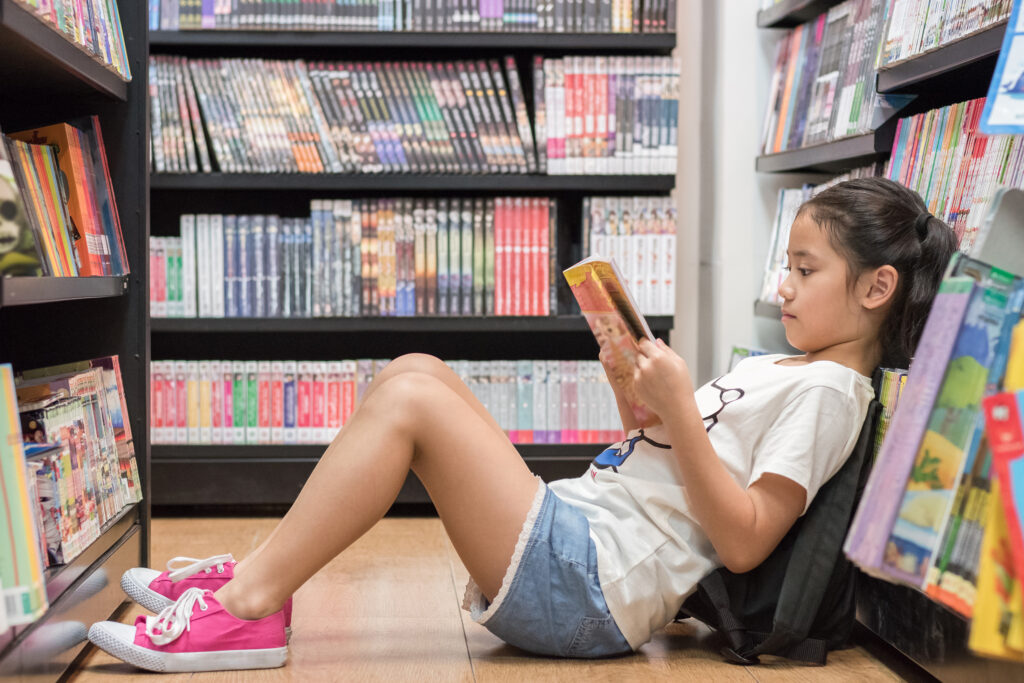I can’t imagine that many people would argue against the fundamental importance of literacy in a child’s development. It’s a critical first step toward success in school and in life. But learning to read is a complex process.
Reading, unlike speaking, needs to be taught, and taught well, so we parents need to ensure that we’re helping our children move along that path in all the ways we know are important and effective. That means, first of all, making sure that your child’s school is following a beginning reading curriculum based on the soundest pedagogy available.
The ABCs of Reading
Then, second, we need to choose wonderful books that our youngest children will love, exposing them to memorable characters, rhyme and wordplay and an extensive vocabulary. And they need to have an array of books to choose from that appeal to them – their sense of humor, their imagination, their aesthetic sensibilities. They need access to well-written books of all genres, books that interest them, and in which they see themselves and their concerns reflected.
Children also need to see the people they admire (parents, siblings, teachers) engaged in reading. Sad to say, many of us adults aren’t the greatest reading role models these days: As reported in The Washington Post, a recent poll revealed that 46% of Americans finished zero books last year and 5% read just one. (Based on this data, if you read 50 or more books this past year, you were truly a one-percenter!)
Another key to encouraging reading is to make sure it’s a joyful, social activity – not a punishment or a burden. That’s where sharing bedtime stories or classroom read-alouds or peer book discussions never goes out of style.
Books are not the enemy
Given the importance of instilling a positive atmosphere around reading, how can there be any argument for banning books, which makes books seem like an enemy or a threat?
Indeed, most challenges these days are made against inclusive literature, such as books that feature LGBTQ or Black characters seeking to find their place in the world. These are precisely the books that kids who feel alienated or lost or unrepresented might look to for help in navigating an already difficult or hostile world, especially as the teen years approach.
Efforts to ban books labeled as “offensive” or causing students to feel “uncomfortable,” have multiplied in recent years. The American Library Association (ALA) recently released data showing that “[b]etween January 1 and August 31, 2023, the ALA’s Office of Intellectual Freedom recorded 695 attempts to ban library materials and services, affecting 1,915 different book titles … a 20% increase from the same reporting period in 2022, which saw the highest number of book challenges since ALA began compiling the data more than 20 years ago.”
Finding the world – and oneself – in a book
Offering access to a variety of books – in any library or classroom or home bookshelf – ensures that children learn “that they’re going to share the world with people who may look and speak differently than they do and they may hold different value systems than they do,” according to Khaled Hosseini, the best-selling author of The Kite Runner (an often-banned book due to its depiction of abuse) in a letter he wrote to a Florida school board that was about to ban his famous book. “Books are a conduit for that sort of learning,” he wrote. “When they’re banned, it’s damaging because restricting access to them keeps schools from doing one of their defining jobs, which is to prepare students for the duties and responsibilities and the challenges of being citizens.”
The practice of banning books undermines the goal of creating a nation of readers prepared with the knowledge and critical thinking skills to contribute to an informed democracy. Many important institutions agree, including the American Library Association and PEN America, which offers tip sheets for how to fight book bans and other excellent resources for parents and students.
At Planet Word, an interactive museum dedicated to language and literacy, we never set out to feature controversial books. But it is hardly a coincidence that 11 of the 74 interactive titles featured in our Schwarzman Family Library gallery are often challenged or banned: A Wrinkle in Time, The Adventures of Huck Finn, Long Way Down and Anne Frank: The Diary of a Young Girl, to name a few. They’re just the books that inspire kids to ask important questions, expose them to new worlds or challenge preconceptions.
At Planet Word, just like parents, we want to show the power of words to make kids feel seen and recognized. And beyond that, we want to turn everyone into lifelong readers and learners – and boost them into that 1%!
Ann Friedman is the founder and CEO of Planet Word, the free, interactive museum of language in downtown Washington, DC. Her interest in literacy began with a lifelong love of reading, early work as a copy editor and translator and a later career as a beginning reading and writing teacher in the Montgomery County Public Schools.


